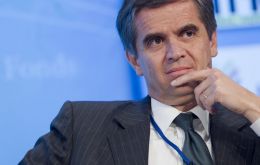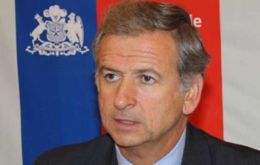MercoPress. South Atlantic News Agency
Tag: Chilean economy
-
Wednesday, December 4th 2019 - 09:50 UTC
Chilean economy contracts 3.4% during October compared to a year ago

Chile's economy contracted 3.4% in October from the same month a year ago, the central bank said, posting the single biggest drop in a decade as weeks of violent protests began sending shockwaves through the Chilean economy.
-
Thursday, September 5th 2013 - 01:48 UTC
Chilean economy slowing but still vigorous with growth ranging of 4% to 4.5%

Chile's central bank cut its forecast range for 2013 GDP growth but maintained inflation and domestic demand predictions as the effects of a slowdown hitting copper demand are moderated by consumer spending.
-
Wednesday, August 14th 2013 - 19:24 UTC
Bachelet pledges mining reforms, including royalties, to help finance programs

Chile's presidential frontrunner Michelle Bachelet says she is studying possible changes to mining policy in the world's top copper producing country. The possible changes include altering mining royalties and funding programs for state-owned mining company Codelco.
-
Friday, February 8th 2013 - 05:13 UTC
Economic activity in Chile expanded 4.7% in December and 5.5% in the twelve months

Economic activity in Chile grew 4.7% in December from the year earlier on gains in the service and retail industries, and ended the twelve months of 2012 with an expansion of 5.5% over the previous year according to Central bank data.
-
Tuesday, January 8th 2013 - 06:58 UTC
Chile government spending rate below the economy’s performance for second year running

Government expenditure in Chile expanded an estimated 5% last year while the economy grew 5.5%, making it the second consecutive year in which the economy outperforms outlays.
-
Wednesday, October 3rd 2012 - 01:42 UTC
Chile a country with a growing disappointed middle class, says Financial Times

The influential business newspaper Financial Times dedicated a special edition to the Chilean economic and social situation and concludes that given the massive demonstrations against energy projects and in favour of education reform, “doing business” in the country has become difficult plus there is growing disappointment in the middle class.
-
Monday, October 1st 2012 - 09:36 UTC
Facing students’ challenge, Piñera presents record spending budget on education

Chilean President Sebastian Piñra unveiled an education-heavy 2013 budget bill on Sunday, as he seeks to improve the conservatives’ credentials before municipal elections in October and next year's presidential election.
